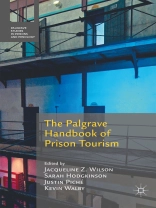This extensive Handbook addresses a range of contemporary issues related to Prison Tourism across the world. It is divided into seven sections: Ethics, Human Rights and Penal Spectatorship; Carceral Retasking, Curation and Commodification of Punishment; Meanings of Prison Life and Representations of Punishment in Tourism Sites; Death and Torture in Prison Museums; Colonialism, Relics of Empire and Prison Museums; Tourism and Operational Prisons; and Visitor Consumption and Experiences of Prison Tourism. The Handbook explores global debates within the field of Prison Tourism inquiry; spanning a diverse range of topics from political imprisonment and persecution in Taiwan to interpretive programming in Alcatraz, and the representation of incarcerated Indigenous peoples to prison graffiti. This Handbook is the first to present a thorough examination of Prison Tourism that is truly global in scope.
With contributions from both well-renowned scholars and up-and-coming researchers in the field, from a wide variety of disciplines, the Handbook comprises an international collection at the cutting edge of Prison Tourism studies. Students and teachers from disciplines ranging from Criminology to Cultural Studies will find the text invaluable as the definitive work in the field of Prison Tourism.
İçerik tablosu
Chapter 1. Introduction.- Section 1. Ethics, Human Rights and Penal Spectatorship.- Chapter 2. Iconic Power, Dark Tourism and the Spectacle of Suffering.- Chapter 3. Remembering and Forgetting the Gulag.- Chapter 4. “A Funny Place for a Prison”.- Chapter 5. Juxtaposing Prison and Other Carceral Sites.- Chapter 6. Mapping the Labyrinth.- Chapter 7. Screening Tourist Encounters.- Chapter 8. Penal Optics and the Struggle for the Right to Look.- Section 2. Carceral Retasking, Curation and Commodification of Punishment.- Chapter 9. Layers of Violence.- Chapter 10. Rottnest or Wadjemup.- Chapter 11. Taiwan’s Former Political Prisons.- Chapter 12. Representing the Maze/Long Kesh Prison in Northern Ireland.- Chapter 13. The “Kresty” Prison and Tourism.- Chapter 14. Prisons, Tourism and Symbolism.- Chapter 15. Rocking the Boat.- Section 3. Meanings of Prison Life and Representations of Punishment in Tourism Sites.- Chapter 16. Vagabonds and Rogues.- Chapter 17. City of Women.- Chapter 18. Constructed Inmates.- Chapter 19. Commemorating Captive Women.- Chapter 20. From Shame to Fame.- Chapter 21. Haunting Encounters at Canadian Penal History Museums.- Chapter 22. In the Steps of Monte Cristo and the “Last Queen of France”.- Section 4. Death and Torture in Prison Museums.- Chapter 23. Penal Tourism and the Paradox of (In)Humane Punishment.- Chapter 24. Representing Political Oppression.- Chapter 25. Punishment as Sublime Edutainment.- Chapter 26. Representations of Capital Punishment in Canadian Penal History Museums.- Chapter 27. Ghost Hunting in Prison.- Chapter 28. Don’t Mess with Texas.- Section 5. Colonialism, Relics of Empire and Prison Museums.- Chapter 29. Empire and Its Aftermath in Four (Post-)Colonial Settings.- Chapter 30. Journeying Towards New Methods in Prison Tourism Research.- Chapter 31. Remembering and Representing Imprisonment in Postcolonial Cities.- Chapter 32. Penal Tourism of the Carceral Other as Colonial Narrative.- Chapter 33. Reversing Criminology’s White Gaze.- Chapter 34. Penal Transportation, Family History and Convict Tourism.- Chapter 35. Inventing a Colonial Dark Tourism Site.- Section 6. Visitor Consumption and Experiences of Prison Tourism.- Chapter 36. Explorations in Banality.- Chapter 37. Visitor Experiences at Prison Museums.- Chapter 38. Execution on Display.- Chapter 39. In Their Own Words.- Chapter 40. Interpretive Programming on Alcatraz Island.- Chapter 41. “Cannibals and Convicts”.- Section 7. Tourism and Operational Prisons.- Chapter 42. The Backpacker’s Guide to the Prison.- Chapter 43. The Prison Tour as a Pedagogical Tool.- Chapter 44. Touring Operational Carceral Facilities as a Pedagogical Tool.- Chapter 45. Why and How Prison Museums/Tourism Contribute to the Normalization of the Carceral/Shadow Carceral State.- Chapter 46. Punitive Healing and Penal Relics.- Chapter 47. Developing Pedagogies of Human Rights and Social Justice in the Prison Museum.- Chapter 48. Sport, Spectacle and Carceral Othering
Yazar hakkında
Jacqueline Z. Wilson is an Associate Professor at Federation University Australia in the Collaborative Research Centre in Australian History. Her research focuses on the intersections between heritage, state care and institutionalization. She is the author of
Prison: Cultural Memory and Dark Tourism, the first national study of prison tourist sites in Australia.
Sarah Hodgkinson is a Senior Lecturer at the Department of Criminology, University of Leicester. Her research interests include crime-related dark tourism (in particular prison and Holocaust tourism), Holocaust representation and memorialization, the social construction of evil, forensic mental health, and homicide.
Justin Piché is Associate Professor in the Department of Criminology at the University of Ottawa and Co-managing Editor of the Journal of Prisoners on Prisons. Justin was awarded the 2012 Aurora Prize from the Social Sciences and Humanities Research Council of Canada and the 2016 Young Researcher Award from the Faculty of Social Sciences at the University of Ottawa.
Kevin Walby is Associate Professor and Chancellor’s Research Chair, Department of Criminal Justice, University of Winnipeg, Canada. He is co-editor of National Security, Surveillance, and Terror: Canada and Australia in Comparative Perspective with R. Lippert, I. Warren and D. Palmer (forthcoming with Palgrave in 2017).












